#larry whitaker
Text
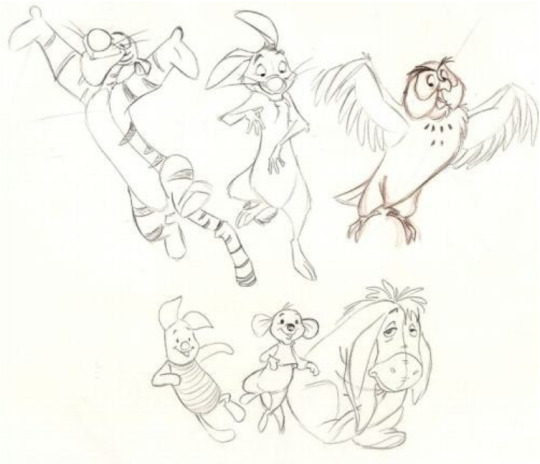
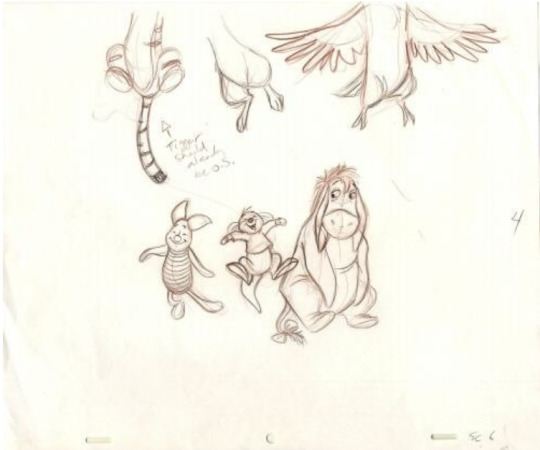

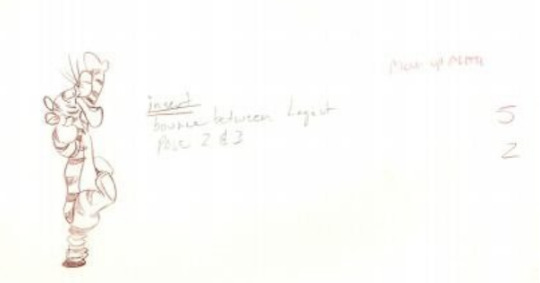
Rough animation drawings done by Larry Whitaker for a 1997 Huggies Supreme Diapers commercial titled "Pooh and Friends"
39 notes
·
View notes
Text
The last episode of Larryboy the Cartoon Adventures aired on May 6th, 2003 (according to IMDB). The cartoons were first produced as stand alone videos, with this episode originally released on video on June 10, 2003 (according to wikipidia). Unlike the original VeggieTales and Larryboy shorts, the animated adventures used 2-D animation and was helmed by ex-Disney animator Tom Bancroft. The videos ended after only 4 videos as part of the fallout of Big Idea's bankruptcy. ("The Good, The Bad, and the Eggly!", Larryboy the Cartoon Adventures, Animation Event)
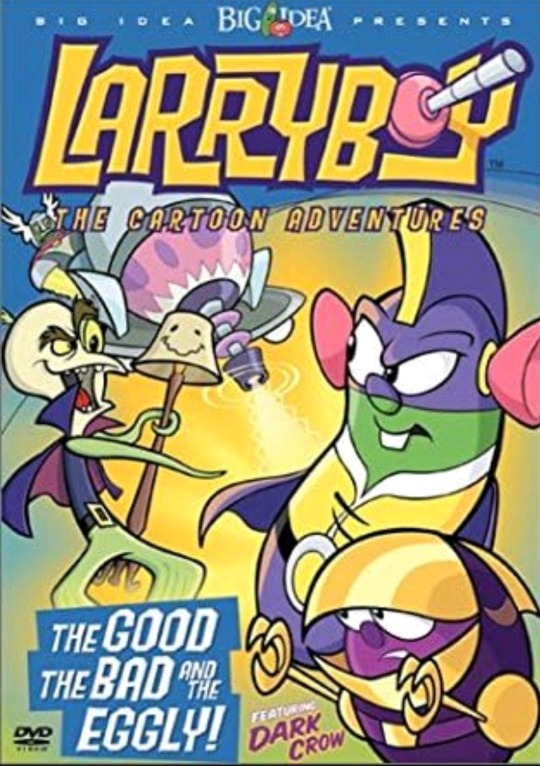
#nerds yearbook#real life event#may#2003#june#animation#cartoon#larryboy#big idea#sean roche#larry whitaker#tom bancroft#mike nawrocki#phil vischer#larry the cucumber#bob the tomato#super hero#lisa vischer#jr asparigus#shari belgeau#vicki#marc graue#bok choi#lee marshall#veggietales#anita protich#lemon twist#jose vincinte#awful alvin
4 notes
·
View notes
Text
Mark Whitaker on his new book
3 notes
·
View notes
Text
Body Snatchers (1993)

I meant to watch every film adaptation of Jack Finney's The Body Snatchers in release order but I messed up and saw 1993's Body Snatchers second. I made a mistake but don't feel too bad about it. In many ways, this film surpasses the original thanks to its spectacular special effects, atmosphere and chilling imagery.
Environmental Protection Agency agent Steve Malone (Terry Kinney) is moving to an Alabama military base with his family to test the effects of the military's actions on the surroundings. There, his daughter Marti (Gabrielle Anwar) notices abnormal behavior from several people. When her little brother says their mom (Meg Tilly) is a doppelganger, she believes him... but who else will?
Body Snatchers suffers from the fact that its title gives away too much, though not as much as the previous films. If you don’t know what the deal is, stop reading and go see this movie.
Barring one scene where a composite shot is rough around the edges, it all looks very convincing and boy does that make for a creepy experience. The characters are warned not to go to sleep. Once you see why, you won’t be able to close your eyes anymore. It’s a perfect example of gore used correctly. It grosses you out but mostly, it unsettles. It makes your skin crawl and makes you sweat.
Like the original picture, Body Snatchers can be a bit slow at points. You know where the plot is headed so you may grow a bit restless, at least at first. There is a turning point where Marti realizes what is happening. It sends a chill down your spine. You’re filled with the kind of panic that only comes from the absolute certainty of imminent, unavoidable defeat. Just when you think there’s a crack for our heroes to slip through, the film takes advantage of your lowered guard and comes at you full force. It pours the terror and despair down your throat. While the special effects are extremely effective, it’s the little moments that have the biggest impact. The emotional bits between Marti and the man she’s starting to fall for, Timm (Billy Wirth), make you think everything's going to be ok. It makes the scene where our heroes realize they've been led into a trap that much more devastating.
Body Snatchers doesn’t include just one shot where the true horror of the story dawns on you. There are at least 7. That’s a rarity even in the best chillers. The pacing issues may not even be there if you have not seen the previous versions (or any number of the derivatives which have come over the years) and I get the feeling that I'll like this one even more next time. (Full-screen version on DVD, July 13, 2018)
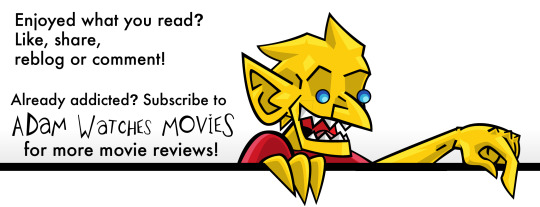
#Body Snatchers#movies#films#movie reviews#film reviews#Abel Ferrara#Stuart Gordon#Dennis Paoli#Nicholas St. John#Raymond Cistheri#Larry Cohen#Gabrielle Anwar#Terry Kinney#Billy Wirth#Forest Whitaker#Meg Tilly#1993 movies#1993 films
3 notes
·
View notes
Text
Hátigen A vicc, hogy az Apollo 11 legénységének is van csillaga a tv-ben nyújtott tevékenységért. Talán a Holdtagadók Társasága szponzorálta :) Végülis: Churchill meg irodalmi Nobel-díjat kapott :)
VIDEO:
A lencsevégre kapott valakik, benne néhány kivándorolt/elmenekült/elűzött magyarral:
Elvis Presley, Orson Welles, Clark Gable, Audrey Hepburn, Arthur Spiegel, Apollo 11 Crew (Neil Armstrong, Edvin E. Aldrin), August Lumiere, Johnny Cash, Humphrey Bogart, Ernest Borgnine, Mariska Hargitay, Kim Novak, Kevin Bacon, Lassie, Ronald Reagan, George Cukor, David Niven, Marlene Dietrich, Jane's Addiction, Richard Pryor, Alfred Hitchcock, Frank Sinatra, Orson Welles, Joseph Szigeti, Tom Jones, Eva Gabor, Larry King, John Cusack, Vladimir Horowitz, Daniel Radcliffe, Celine Dion, Bee Gees, Matt Damon, Forest Whitaker, Martin Landau, Billy Bob Thornton, Harrison Ford, Kevin Costner, Russel Crowe, Anthony Hopkins, Martin Scorsese, Charlize Theron, Nicole Kidman, Halle Berry, Steven Spielberg, Jamie Foxx, Jamie Foxx, Susan Sarandon, Whoopi Goldberg, Bela Lugosi, Arnold Schwarzenegger, Rod Stewart, Hugh Laurie, Ella Fitzgerald, Aerosmith, Janis Joplin, Mötley Crue, Marilyn Monroe, Ozzy Osbourne, Jay Leno, Sandra Bullock, Keanu Reeves, Anthony Perkins, Britney Spears, Antonio Banderas, Peter Jackson, Ryan Reynolds, Ricky Martin, The Doors, Slash, John Travolta, Salma Hayek, Charles Bronson, William Shatner, Godzilla, Tom Selleck, Tom Selleck, Jodie Foster, Quentin Tarantino, Zsa Zsa Gabor, Elton John, Billy Crystal, Bruce Willis, Tommy Lee Jones, Bruce Lee, Orlando Bloom, Eddie Murphy, Drew Barrymore, Julio Iglesias, Glenn Close, James Dunn, Alice Cooper, Henry Fonda, David Hasselhoff, Patrick Swayze, Richard Chamberlain, Samuel L. Jackson, Johnny Depp, RuPaul, Peter Falk, Thomas A. Edison, Helen Mirren, Tony Curtis, Dwayne Johnson, Groucho Marx, Greta Garbo, Kermit the Frog, Mariah Carey, George Clooney, Colleen Moore, Eddie Murphy, Denzel Washington, Walter Matthau, Arnold Schwarzenegger, Peter Sellers, Sophia Loren, Anthony Quinn, Sean Connery, Al Pacino, Johnny Depp, Robert de Niro, The Hunger Games, Kevin Costner, Kim Novak, Henry Fonda, etc.

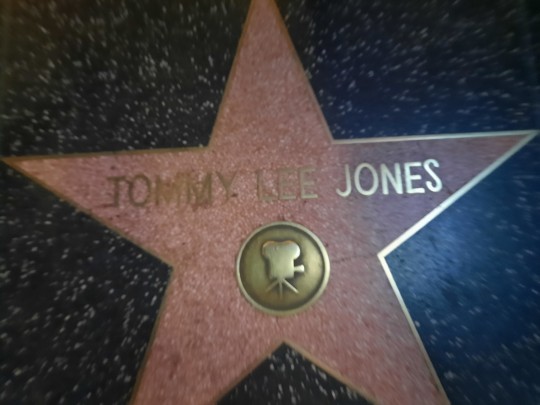


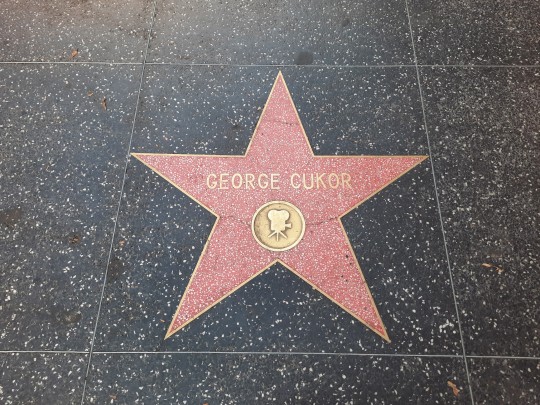


As of 2023, the Walk of Fame comprises 2,752 stars, which are spaced at 6-foot (1.8 m) intervals. There is a $75,000 sponsorship fee upon selection. The fee is used to pay for the creation and installation of the star, as well as maintenance of the Walk of Fame.

Donald Trump valamivel leöntve. Nem akarom tudni, hogy mivel öntötték le ennek a derék, becsületes, szőke, fehér hazafinak a csillagát.
#Elvis Presley#Orson Welles#Clark Gable#Audrey Hepburn#Arthur Spiegel#Apollo 11 Crew#Neil Armstrong#Edvin E. Aldrin#August Lumiere#Johnny Cash#Humphrey Bogart#Ernest Borgnine#Mariska Hargitay#Kim Novak#Kevin Bacon#Lassie#Ronald Reagan#George Cukor#David Niven#Marlene Dietrich#Jane's Addiction#Richard Pryor#Alfred Hitchcock#Frank Sinatra#Joseph Szigeti#Tom Jones#Eva Gabor#Larry King#John Cusack
12 notes
·
View notes
Text
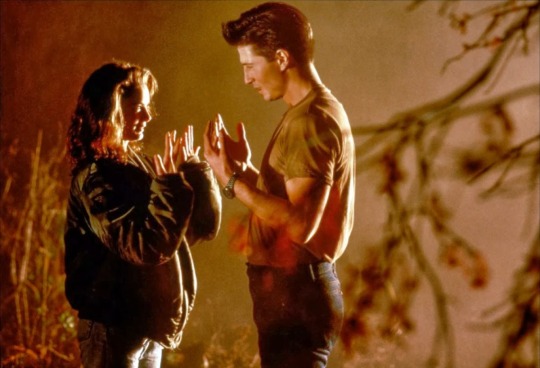
Gabrielle Anwar and Billy Wirth in Body Snatchers (Abel Ferrara, 1993)
Cast: Gabrielle Anwar, Terry Kinney, Meg Tilly, Billy Wirth, Reilly Murphy, Christine Elise, R. Lee Irmey, Kathleen Doyle, Forest Whitaker, G. Elvis Phillips. Screenplay: Raymond Cistheri, Larry Cohen, Stuart Gordon, Dennis Paoli, Nicholas St. John, based on a novel by Jack Finney. Cinematography: Bojan Bazelli. Production design: Peter Jamison. Film editing: Anthony Redman. Music: Joe Delia.
Abel Ferrara's version of Jack Finney's novel The Body Snatchers is nothing if not economical. The economy extends to the title: Don Siegel's 1956 version and Philip Kaufman's 1978 one were called Invasion of the Body Snatchers; Ferrara even drops the definite article. The story, too, has been pared down. Ferrara's version sets the story on a military base in Alabama instead of the urban California of the previous films. It also shifts the focus to a teenage girl, Marti Malone (Gabrielle Anwar), who comes with her family to the base when her father (Terry Kinney) is sent there by the EPA to investigate chemical pollution. The dynamic of a rebellious adolescent in a military culture is perfect for the conflict between individualism and conformity, the theme that unites all of the versions of Finney's story. In addition to her father, Marti's dysfunctional family consists of her stepmother, Carol (Meg Tilly), whom she dislikes, and her young half-brother, Andy (Reilly Muphy), who annoys her. Andy is the first to sense that something is seriously wrong in their new home when, during an art class at day care, all the other kids produce identical finger paintings. As they hold up their paintings, the teacher murmurs approvingly at each one until she comes to a halt at Andy's, which is unique. She clearly disapproves. One by one, the fact that people are being somehow replaced by identical but emotionless beings becomes clear. Ferrara is not particularly interested in the mechanics of invasion and transformation that took up more narrative space in the previous films. We get some nicely disgusting body horror scenes, but the response of Marti to the alien takeover is what drives the plot as she teams up with a handsome young helicopter pilot named Tim (Billy Wirth) to fight off the invaders. Tim's stoic military manner keeps us unsure whether he's not already one of the pod people, an ambiguity that persists until the end of the movie. Body Snatchers is a good rethinking of material whose previous versions are now considered classics. The source material was mined again for a fourth version, The invasion (Oliver Hirschbiegel, 2007), which starred Nicole Kidman and Daniel Craig but bombed with the critics.
7 notes
·
View notes
Text
Octobre MMXXIII
Films
Le miroir se brisa (The Mirror Crack'd) (1980) de Guy Hamilton avec Angela Lansbury, Geraldine Chaplin, Tony Curtis, Edward Fox, Rock Hudson, Kim Novak, Elizabeth Taylor, Wendy Morgan et Margaret Courtenay
L'Homme de Rio (1964) de Philippe de Broca avec Jean-Paul Belmondo, Françoise Dorléac, Jean Servais, Milton Ribeiro, Simone Renant, Adolfo Celi, Ubiracy De Oliveira, Roger Dumas et Daniel Ceccaldi
Opération Dragon (Enter the Dragon) (1973) de Robert Clouse avec Bruce Lee, John Saxon, Jim Kelly, Ahna Capri, Shih Kien, Bob Wall, Angela Mao et Betty Chung
Le Grand Bain (2018) de Gilles Lellouche avec Mathieu Amalric, Guillaume Canet, Benoît Poelvoorde, Jean-Hugues Anglade, Philippe Katerine, Félix Moati, Alban Ivanov, Balasingham Thamilchelvan, Virginie Efira et Leïla Bekhti
Bernadette (2023) de Léa Domenach avec Catherine Deneuve, Denis Podalydès, Michel Vuillermoz, Sara Giraudeau, Laurent Stocker, François Vincentelli, Lionel Abelanski, Artus, Scali Delpeyrat et Barbara Schulz
Gaz de France (2015) de Benoît Forgeard avec Olivier Rabourdin, Philippe Katerine, Alka Balbir, Antoine Gouy, Philippe Laudenbach, Darius, Jean-Luc Vincent et Élizabeth Mazev
Mariage à l'italienne (Matrimonio all'italiana) (1964) de Vittorio De Sica avec Sophia Loren, Marcello Mastroianni, Aldo Puglisi, Tecla Scarano, Marilù Tolo, Enzo Aita, Gianni Ridolfi et Generoso Cortini
Adieu poulet (1975) de Pierre Granier-Deferre avec Lino Ventura, Patrick Dewaere, Victor Lanoux, Julien Guiomar, Pierre Tornade, Françoise Brion, Claude Rich et Claude Brosset
Des hommes d'honneur (A Few Good Men) (1992) de Rob Reiner avec Tom Cruise, Jack Nicholson, Demi Moore, Kevin Bacon, Kiefer Sutherland, Kevin Pollak, James Marshall et J. T. Walsh
La Vie de château (1966) de Jean-Paul Rappeneau avec Philippe Noiret, Catherine Deneuve, Pierre Brasseur, Mary Marquet, Henri Garcin, Carlos Thompson et Marc Dudicourt
Tout ce que le ciel permet (All That Heaven Allows) (1955) de Douglas Sirk avec Jane Wyman, Rock Hudson, Agnes Moorehead, Conrad Nagel, Virginia Grey, Gloria Talbott, William Reynolds et Charles Drake
L'Attentat (1972) de Yves Boisset avec Jean-Louis Trintignant, Michel Piccoli, Jean Seberg, Gian Maria Volonté, Michel Bouquet, Bruno Cremer, Daniel Ivernel, Philippe Noiret, François Périer et Roy Scheider
Chaplin (1992) de Richard Attenborough avec Robert Downey Jr., Geraldine Chaplin, Paul Rhys, John Thaw, Milla Jovovich, Moira Kelly, Anthony Hopkins, Dan Aykroyd et Marisa Tomei
L’Évadé d’Alcatraz (Escape from Alcatraz) (1979) de Don Siegel avec Clint Eastwood, Patrick McGoohan, Roberts Blossom, Fred Ward, Jack Thibeau, Paul Benjamin et Larry Hankin
Les Sorcières d'Eastwick (The Witches of Eastwick) (1987) de George Miller avec Jack Nicholson, Cher, Susan Sarandon, Michelle Pfeiffer, Veronica Cartwright et Richard Jenkins
Bird (1988) de Clint Eastwood avec Forest Whitaker, Diane Venora, Michael Zelniker, Samuel E. Wright, Keith David, Michael McGuire et James Handy
Wolf (1994) de Mike Nichols avec Jack Nicholson, Michelle Pfeiffer, James Spader, Kate Nelligan, Richard Jenkins, Christopher Plummer et Eileen Atkins
Séries
Brokenwood Saison 8
Du berceau au tombeau - Sortie de scène - Du rififi au paradis - L’homme qui valait 6 dollars - L’or ne fait pas le bonheur
Affaires sensibles
Massacre du Bloody Sunday : la vérité 38 ans après - Bobby Sands, destin tragique d’un héros de l'indépendance Irlandaise - 1979, ils ont assassiné l’oncle de la Reine Elizabeth II - Les Malouines : bataille navale dans l’Atlantique Sud - La chute de la Dame de fer - « La Dame de fer, le Roi Arthur et la grève des Mineurs » - Dr Goldman et Mister Sachs - Elizabeth Holmes, l’arnaqueuse de la Silicon Valley - 13 mai 1981 : le jour où on a voulu tuer le pape Jean-Paul II - Tuer de Gaulle, l'attentat du Petit-Clamart - Bugaled Breizh : un naufrage en eaux troubles - Le monstre du Loch Ness, un animal merveilleusement insaisissable
Inspecteur Barnaby Saison 13, 16
Meurtres sur mesure - L'épée de Guillaume - Du sang sur les éperons - Les Fantômes de March Magna - La Musique en héritage - Mort par K.O. - La Bataille des urnes - Régime fatal - Les meurtres de Copenhague
Coffre à Catch
#135 : Christian est de retour !!! - #136 - Christian veut le titre de Jack Swagger - #137 : DANS LE MAIN EVENT: Christian nouveau champion ECW ? - #138 : Kane contre le Boogeyman + Santino à la ECW ! - #139 : Le jour où Triple H débarque chez Randy Orton !
Happy Days Saison 3, 4
Un locataire encombrant - La Bécane de Fonzie - Fonzie le téméraire : première partie - Fonzie le téméraire : deuxième partie - Une de trouvée et dix de perdues - Œil pour œil, poing pour poing - Une famille contestataire - Les Quarante-cinq ans d'Howard - Fonzie fait la loi - Cours de drague - Les Vacances de Pâques - La Soirée hawaïenne - Quatorze ans trois quarts - Chagrin d'amour - Un tango pour Fonzie - Représentant ou dresseur de fauves - Baby sitting - Fonzie Superstar - Qui sera le pigeon ? - Le Concours de beauté - Spike fait des bêtises - Fonzie porte des lunettes - Le Mariage d'Arnold - Fonzie est amoureux : première partie - Fonzie est amoureux : deuxième partie - Fonzie est amoureux : troisème partie - Fonzie chez le psychiatre - Pas de panique, restons cool ! - Une dette envers Potsie - Richie s'émancipe - Marathon de danse - Richie grand reporter - Fonzie et le shérif - Nouvelle conquête - Le Rendez-vous de Fonzie - Nuit d'enfer dans une remise - La Soirée des records - La gloire est éphémère
Castle Saison 3
Un homme en colère - Tranches de mort - Eau trouble - Le Tueur de L.A. - Mort d'une miss / La Mort d’une miss - La Traque
Top Gear Saison 21
Nostalgie des années 80 - Road Trip à Tchernobyl - Abu Dhabi, Du Sable dans le Carbu ! - Mercedes, folle du désert - Destination Thaïlande - Un pont sur la rivière Kwaï
Alexandre Ehle Saison 4
Cœur de pierre - Puzzle au zoo
Sous contrôle Saison 1
Episode 1 - Episode 2 - Episode 3 - Episode 4 - Episode 5 - Episode 6
Parlement Saison 3
On ne peut plus rien dire - Le background - Ego to absolvo - Le grand départ - Super pro Brexit - Riders - You shall not pass - Comme le disait Jean Monnet - Fish and ships - Europe, the musical
Les Petits meurtres d'Agatha Christie 70's Saison 3
En un claquement de doigt
Kaamelott Livre III
Le Jour d’Alexandre - La Cassette II - Poltergeist - Les Paris II - Au Bonheur des Dames - Les Tourelles - Cuisine et Dépendances - Arthur sensei - Le Solitaire - Les Festivités - La Menace fantôme - La Coopération - L’Empressée
Spectacles
Les inoubliables : les plus grandes BO du cinéma italien (2023) par le Radici orchestra, Céline Laborie, Simona Boni et Rocco Femia
Livres
OSS 117 : Délire en Iran de Jean Bruce
Lucky Luke : Tome 26 : Nitroglycérine de Morris et Lo Hartog van Banda
Le Chat : Tome 4 : Le Quatrième Chat de Philippe Geluck
Détective Conan : Tome 14 de Gôshô Aoyama
Détective Conan : Tome 15 de Gôshô Aoyama
Spirou et Fantasio : Tome 7 : Le Dictateur et le champignon de Franquin
Astérix : Tome 40 : L'Iris Blanc de Fabcaro et Didier Conrad
Détective Conan : Tome 16 de Gôshô Aoyama
Jack Palmer : Tome 12 : L'enquête corse de René Pétillon
Détective Conan : Tome 17 de Gôshô Aoyama
0 notes
Text
"Trumps Criminal Associates from A to Z”
Donald Trump, Melania Trump, Donald Trump Jr., Ivanka Trump, Eric Trump; >>> Greg Abbott, Ali Alexander, Samuel Alito, Rick Allen, Brian Babin, Jim Banks, Steve Bannon, Kathy Barnette, Bill Barr, Tom Barrack, Maria Bartiromo, Glenn Beck, John Bennett, Andy Biggs, Dan Bishop, Christina Bobb, Lauren Boebert, John Bolton, David Bossie, Kevin Brady, Mike Braun, Mo Brooks, Taylor Budowich, Ted Budd, Aileen Cannon, Madison Cawthorn, Tucker Carlson, Matthew Calamari, Kenneth Chesebro, Andrew Clyde, Jeffery Clark, Robert Cheeley, Chris Christie, Chris Collins, Susan Collins, James Comer, Kellyanne Conway, John Cornyn, Thomas Bryant Cotton, Kevin Cramer, Dan Crenshaw, Steven Crowder, Raphael Edward Cruz, Ken Cuccinelli, Warren Davidson, Louis DeJoy, Carlos DeOliveira, Ron DeSantis, Betsy DeVos, Lou Dobbs, Byron Donalds, John Eastman, Larry Elder, Jenna Ellis, Michael Ellis, Tom Emmer, Boris Epshteyn, Julie Jenkins Fancelli, Nigel Farage, Tom Fitton, Harrison Floyd, Michael Flynn, Matt Gaetz, Bob Gibbs, Newt Gingrich, Rudy Giuliani, Louie Gohmert, Sebastian Gorka, Paul Gosar, Trey Gowdy, Lindsey Graham, Charles Grassley, Mark Green, Marjorie Taylor Greene, Ric Grenell, Kimberly Guilfoyle, Alina Habba, Harriet Hageman, Misty Hampton, Liz Harrington, Nikki Haley, Scott Hall, Sean Hannity, Josh Hawley, Jody Hice, Hope Hicks, Thomas Homan, Richard Hudson, Duncan Hunter, Laura Ingraham, Kay Ivey, Ronny Jackson, Jim Jordan, Mike Johnson, Ron Johnson, Alex Jones, Fred Keller, Keith Kellogg, Mike Kelly, Bernard Kerik, Charlie Kirk, Kim Klacik, Kenneth Klukowski, Jared Kushner, Trevian Kutti, Tomi Lahren, Kari Lake, Cathleen Latham, Bill Lee, Mike Lee, Stephen Lee, Mark Levin, Corey Lewandowski, Christopher Liddell, Mike Lindell, Billy Long, Barry Loudermilk, Cynthia Lummis, Nick Luna, Nancy Mace, Paul Manafort, Roger Marshall, Thomas Massie, Douglas Mastriano, Angela McCallum, Kevin McCarthy, Mitch McConnell, Ronna Romney McDaniel, Kayleigh McEnany, Johnny McEntee, Mark Meadows, Molly Michael, Chris Miller, Jason Miller, Stephen Miller, Barry Moore, Steven Mnuchin, Rupert Murdoch, Greg Murphy, Heather Nauret, Waltine Torre Nauta Jr., Peter Navarro, Carl Nichols, Kristi Noem, Ralph Norman, Oliver North, Devin Nunes, Bill O’Reilly, Candace Owens, Stefan Passantino, Kash Patel, Dan Patrick, Rand Paul, Ken Paxton, David Perdue, Scott Perry, Rick Perry, Mike Pence, Judge-Jeanine Ferris Pirro, Mike Pompeo, Erik Prince, Vladimir Putin, Sidney Powell, Kim Reynolds, Karrin Taylor Robson, Michael Roman, Chip Roy, Marco Rubio, Anthony Sabatini, Sarah Huckabee Sanders, George Santos, Steve Scalise, Dan Scavino, Rick Scott, Tim Scott, Jeff Sessions, David Shafer, Ben Shapiro, Bill Shine, Kyrsten Lea Sinema, Ray Smith lll, Victoria Spartz, Sean Spicer, Todd Starnes, Elise Stefanik, William Stepien, Shawn Still, Roger Stone, Jason Sullivan, Clarence Thomas, Virginia (Ginni) Thomas, Tommy Tuberville, Mike Turner, James David (JD) Vance, Herschel Walker, Kelli Ward, Jesse Watters, Allen Weisselberg, Matthew George Whitaker, Susan Wiles, Ben Williamson, Chad Wolf, Lin Wood, Todd Young…Just to name a few. “Vote Blue in November: In numbers too big to rig, in numbers too real to steal….
381 Comments https://www.youtube.com/watch?v=SY8rIL3xUKc
1 note
·
View note
Text
Assistir Filme Ponto de Partida Online fácil
Assistir Filme Ponto de Partida Online Fácil é só aqui: https://filmesonlinefacil.com/filme/ponto-de-partida/
Ponto de Partida - Filmes Online Fácil
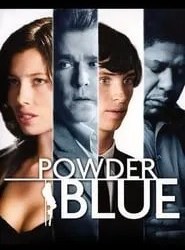
Neste filme, a vida de moradores de Los Angeles se entrelaçam de maneira delicada e perigosa. Velvet Larry (Patrick Swayze) é o dono de um clube de Strippers no qual Rose (Jessica Biel) trabalha como dançarina. Doolittle (Eddie Redmayne) é um agente funerário apaixonado por Rose. Randall (Kris Kristofferson) é o líder de uma organização criminosa conturbada, e Charlie (Forest Whitaker) um ex-padre que se relaciona com uma transsexual. Mas, até nos lugares mais obscuros podemos encontrar esperanças e sonhos.
0 notes
Photo
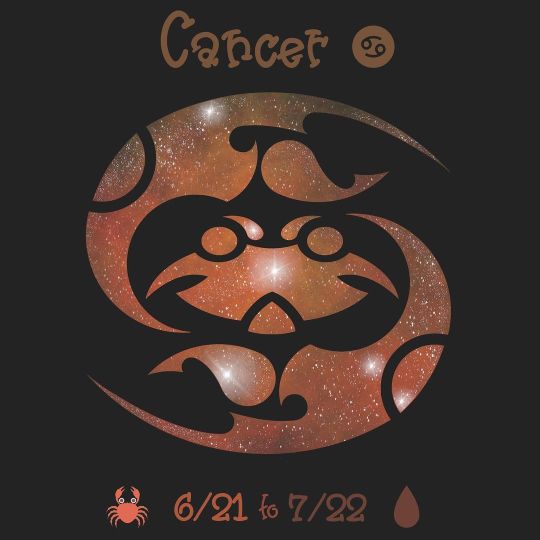
#Summer has arrived, and with it we transition today into #Cancer. These often mis-read, soft-bellied crustaceans, are well known for their moodiness (characteristic of most water signs), as well as their fierce loyalty. If you’re born under this sign, then count yourself amongst the many others below: Dalai Lama 📿 Alexander the Great Frida Kahlo 🖌 Elon Musk AND Richard Branson 🤯 @richardbranson Helen Keller Messi ⚽️ @leomessi Nelson Mandela ✌🏻 Rembrant 🧑🏼🎨 Forest Whitaker @forestwhitaker Anjelica Huston AND Kathy Bates 😱 Larry David Kevin Hart Sir Patrick Stewart 💕 @sirpatstew Mike Tyson 🥊 @miketyson P.T. Barnum🎪 Hunter S. Thompson🍻🚬 and so many, many more. The Constellation origins are as follows from what I could gather online mostly: The word itself ‘Cancer’ is based on the ancient Indo-European root word ‘to scratch’. In many cultures it is often depicted as a shelled creature: scarab, turtle, lobster, crayfish, or most popularly, the #crab. In western culture the constellation’s origin is based on the #Karkinos (#Carcinus to some…lots of translations here sorry). Apparently the story goes, during Heracles’ second labor against the Lernaean Hydra, Hera sent a giant crab to distract him. The crab grabbed his ankle, and #Heracles promptly smashed it bits under his heel (yikes). However as a reward for it’s sacrifice #Hera placed that felled creature into the sky, thus creating the #constellation known as ‘Cancer’. #mythology #herakles #astrology #horoscope #vectorart #adobeillustrator #adobephotoshop #artist #art #illustration #illustrator #illustratorsoninstagram #digitalart #digitalartist #digitalillustration #digitalpainting #design #designer #orangecountyart #zodiac #losangelesart #stilesofart @adobe @photoshop @_adobeillustrator_ @procreate https://www.instagram.com/p/CfIGMqFPDMY/?igshid=NGJjMDIxMWI=
#summer#cancer#crab#karkinos#carcinus#heracles#hera#constellation#mythology#herakles#astrology#horoscope#vectorart#adobeillustrator#adobephotoshop#artist#art#illustration#illustrator#illustratorsoninstagram#digitalart#digitalartist#digitalillustration#digitalpainting#design#designer#orangecountyart#zodiac#losangelesart#stilesofart
0 notes
Text
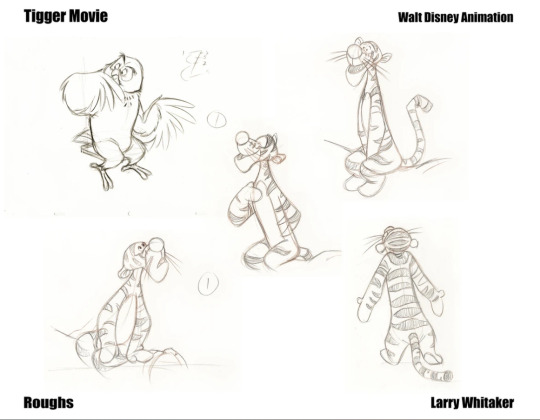
Rough drawings done by sequence director Larry Whitaker for The Tigger Movie (2000)
33 notes
·
View notes
Photo
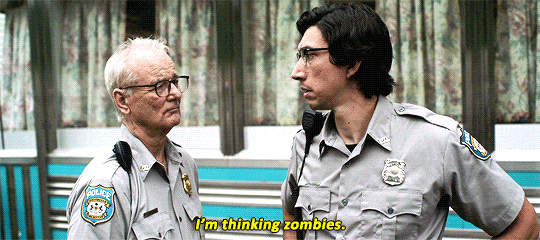
- Guys. Shouldn't we be telling each other that's it all gonna be ok? That this will all go away like a bad dream? Ronnie?
- Gee Mindy I'm not sure I can say that.
- Cliff. Please?
- It's all gonna be ok Mindy. Maybe it'll all just go away, like a bad dream.
- I doubt it.
The Dead Don't Die, Jim Jarmusch (2019)
#Jim Jarmusch#Bill Murray#Adam Driver#Tom Waits#Chloë Sevigny#Steve Buscemi#Danny Glover#Eszter Balint#Maya Delmont#Jahi Di'Allo Winston#Taliyah Whitaker#Caleb Landry Jones#RZA#Larry Fessenden#Rosie Perez#Carol Kane#Tilda Swinton#Iggy Pop#Sara Driver#Selena Gomez#Austin Butler#Luka Sabbat#Frederick Elmes#Sqürl#Affonso Gonçalves#2019
56 notes
·
View notes
Text
Phone Booth (2002)
Fun Fact:
The events of the film occur in real time.

An Awesome Hitchcock-related Fact:
Screenwriter Larry Cohen originally pitched the concept of a film that takes place entirely within a phone booth to Alfred Hitchcock in the 1960s. Hitchcock liked the idea, but he and Cohen were unable to figure out a plot reason for keeping the film confined to a booth. Once the idea of a sniper came to Cohen in the late 1990s, he was able to write the script in under a month.

Real World Police Incompetence Fact:
During the movie, when the Caller warns Stu not to move, he says "You can get shot 41 times just for pulling out your wallet." This is a reference to the killing of Amadou Diallo. The police approached him and he pulled out his wallet (presumably to show them his ID), they mistakenly thought it was a gun and the four officers on scene fired 41 rounds at him. He was shot 19 times and died as a result of his injuries.

Interesting Casting Fact:
Roger Jackson (who voiced Ghostface in the "Scream" films) was the original choice for the Caller.


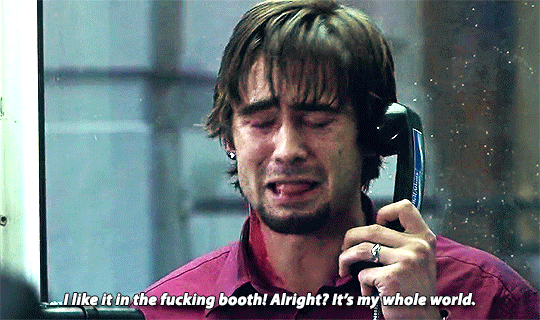
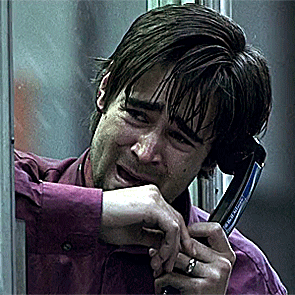
ESE: 107/100
50
+10 for Colin Farrell
+5 for Stu being the final user of the phone booth
+2 for Ben Foster
+3 for heel-click
+5 for pizza delivery to a phone booth
-5 for being rude to the pizza dude
+5 for Katie Holmes
+5 for using *69, something which future generations would NOT understand
+5 for the escort, Felicia
+10 for Kiefer Sutherland’s voice
-10 for Stu’s dismissiveness
+10 for Forest Whitaker
+2 for the Shepard Fairey André stencils near the booth (OBEY!)
+10 for confessing all
-5 for killing the pizza guy
+5 for saving his wife and, ultimately, himself
#Phone Booth#Joel Schumacher#Colin Farrell#Katie Holmes#Jared Leto#Ben Foster#Radha Mitchell#Tia Texada#Forest Whitaker#Kiefer Sutherland#Paula Jai Parker#Arian Ash#Josh Pais#suspense#thriller#crime#movies#films#world record#review
24 notes
·
View notes
Text
reading list - 900: history & geography
CLICK HERE TO ACCESS MY OTHER READING LISTS.
✵ ACTIVELY UPDATING ✵
☐ 901: FOUCAULT, Michel – Les mots et les choses
☐ 901: GOULD, Stephen Jay – Questioning the Millenium
☐ 901: McNEILL, William H. – The Rise of the West
☐ 902: WEIR, Stephen – Encyclopedia Idiotica
☐ 907: JONNES, Jill – Eiffel's Tower
☐ 909: HARARI, Yuval Noah – Homo Deus
☐ 909: ROGAN, Eugene – The Arabs
☐ 909: TOYNBEE, Arnold J. – A Study of History
☐ 910: POOLE, Robert M. – Explorers House
☐ 911: BROTTON, Jerry – A History of the World in 12 Maps
☐ 914: SHANAHAN, Brendan – In Turkey I Am Beautiful
☐ 914: WEST, Rebecca – Black Lamb and Grey Falcon
☐ 915: FLETCHER, David – Brian on the Brahmaputra
☐ 918: SIMONS, Eric – Darwin Slept Here
☐ 919: KAVENNA, Joanna – The Ice Museum
☐ 920: COLLINS, Paul – Banvard's Folly
☐ 920: STRACHEY, Lytton – Eminent Victorians
☐ 933: PEROWNE, Stuart – The Life & Times of Herod the Great
☐ 936: TACITUS – Agricola
☐ 937: BEARD, Mary – SPQR: A History of Ancient Rome
☐ 937: SUETONIUS – De vita Caesarum
☐ 937: TACITUS, Publius Cornelius – Annals
☐ 938: McKEOWN, J. C. – A Cabinet of Greek Curiosities
☐ 938: THUCYDIDES – History of the Peloponnesian War
☐ 939: CLAPP, Nicholas – The Road to Ubar
☐ 940: CHURCHILL, Winston – The Second World War
☐ 940: MARKS, Leo – Between Silk and Cyanide
☐ 940: TUCHMAN, Barbara – The Guns of August
☐ 942: FRASER, Antonia – Faith and Treason
☐ 943: HETT, Benjamin Carter – Burning the Reichstag
☐ 946: ORWELL, George – Homage to Catalonia
☐ 946: SHRADY, Nicholas – The Last Day
☐ 949: ROSEN, William – Justinian's Flea
☐ 951: SCHELL, Orville & DELURY, John – Wealth and Power
☐ 951: SPENCE, Jonathan D. – The Gate of Heavenly Peace
☐ 955: AXWORTHY, Michael – Revolutionary Iran
☐ 956: ROBERTS, Jo – Contested Land, Contested Memory
☐ 960: MEREDITH, Martin – The Fate of Africa
☐ 966: De VILLIERS, Marq & HIRTLE, Sheila – Timbuktu
☐ 967: DINESEN, Isak – Out of Africa
☐ 970: KING, Thomas – The Inconvenient Indian
☐ 971: HELE, Karl S. – The Nature of Empires and the Empires of Nature
☐ 972: GLASSMAN, Steve & ANAYA, Armando – Cities of the Maya in Seven Epochs
☐ 973: CUMMINGS, Joseph – Ten Tea Parties
☐ 973: DUBOIS, W. E. B. – The Souls of Black Folk
☐ 973: FOOTE, Shelby – The Civil War
☐ 973: HOFSTADTER, Richard – The American Political Tradition and the Men Who Made It
☐ 973: McPHERSON, James M. – Battle Cry of Freedom
☐ 973: TURNER, Frederick Jackson – The Frontier in American History
☐ 973: WILLIAMS, William Carlos – In the American Grain
☐ 974: CARO, Robert A. – The Power Broker
☐ 974: SHORTO, Russell – The Island at the Center of the World
☐ 978: DRURY, Bob & CLAVIN, TOm – The Heart of Everything That Is
☐ 981: LÉVI-STRAUSS, Claude – Tristes Tropiques
☐ 985: ADAMS, Mark – Turn Right at Machu Picchu
☐ 996: ALEXANDER, Caroline – The Bounty
☐ 998: MULVANEY, Kieran – At the Ends of the Earth
☐ 999: LEMONICK, Michael D. – Other Worlds
BIOGRAPHY
☐ ADAMS, Henry Brooks – The Education of Henry Adams
☐ ANGELOU, Maya – I Know Why the Caged Bird Sings
☐ BASCOM, Tom – Chameleon Days
☐ BATE, Walter Jackson – Samuel Johnson
☐ BETANCOURT, Ingrid – Even Silence Has an End
☐ BOYD, Julia – The Excellent Doctor Blackwell
☐ CAMPBELL, Olivia – Women in White Coats
☐ CHANG, Jung – Wild Swans
☐ CHENEY, Margaret – Tesla
☐ EVERITT, Anthony – Cicero
☐ FRANK, Anne – The Diary of a Young Girl
☐ FRANKLIN, Benjamin – The Autobiography of Benjamin Franklin
☐ GILMOUR, David – Curzon
☐ GOWING, Lawrence – Vermeer
☐ HACKEL, Steven W. – Junipero Serra
☐ ISAACSON, Walter – The Code Breaker
☐ JAGER, Eric – Blood Royal
☐ JOHNSON, Paul – Mozart
☐ KALANITHI, Paul – When Breath Becomes Air
☐ KAPLAN, Fred – Thomas Carlyle
☐ KAY, Adam – This Is Going to Hurt
☐ LEKUTON, Joseph Lemosolai – Facing the Lion
☐ LEVI, Primo – Se questo è un uomo
☐ LOFTIS, Larry – The Princess Spy
☐ MALCOLM X – The Autobiography of Malcolm X
☐ MAN, John – Attila
☐ MAN, John – Gutenberg
☐ MARCHANT, Jo – The Shadow King
☐ MARKHAM, Beryl – West With the Night
☐ MEYER, G. J. – The Borgias
☐ MILTON, Giles – Samurai William
☐ MUKHERJEE, Siddhartha – The Emperor of All Maladies
☐ NABOKOV, Vladimir Vladimirovich – Insomniac Dreams
☐ NABOKOV, Vladimir Vladimirovich– Speak, Memory
☐ NIMURA, Janice P. – The Doctors Blackwell
☐ OLSZEWSKI, Erin Marie – Undercover Epicenter Nurse
☐ PARKER, Richard – The Improbable Return of Coco Chanel
☐ PAUSCH, Randy & ZASLOW, Jeffrey – The Last Lecture
☐ RANDALL, Margaret – Che on My Mind
☐ SCHILLACE, Brandy – Mr. Humble and Dr. Butcher
☐ SINCLAIR, David – The Land That Never Was
☐ SKLOOT, Rebecca – The Immortal Life of Henrietta Lacks
☐ STEINEM, Gloria – Marilyn
☐ TWAIN, Mark – The Autobiography of Mark Twain
☐ WALLS, Jeannette – The Glass Castle
☐ WASHINGTON, Booker T. – Up From Slavery
☐ WEATHERFORD, Jack – Genghis Khan
☐ WELSH, Mary Sue – One Woman in a Hundred
☐ WESTOVER, Tara – Educated
☐ WHITAKER, Robert – The Mapmaker's Wife
☐ WOLFF, Tobias – This Boy's Life
☐ WOODHAM-SMITH, Cecil – Florence Nightingale
☐ WRIGHT, Richard – Black Boy
☐ XUE, Xinran – Sky Burial
#books#reading list#what to read#dewey decimal system#nonfiction#history#geography#biography#autobiography#academia#give me recommendations
11 notes
·
View notes
Text
Wellesley Writes It: Conversation with Sumita Chakraborty '08 (@notsumatra), author of ARROW

Sumita Chakraborty is a poet, essayist, scholar, and a graduate of Wellesley College, class of 2008. Her debut collection of poetry, Arrow, was released in September 2020 with Alice James Books in the United States and Carcanet Press in the United Kingdom, and has received coverage in The New York Times, NPR, and The Guardian. Her first scholarly book, tentatively titled Grave Dangers: Death, Ethics, and Poetics in the Anthropocene, is in progress. She is Helen Zell Visiting Professor in Poetry at the University of Michigan - Ann Arbor, where she teaches in literary studies and creative writing.
Sumita’s poetry appears or is forthcoming in POETRY, The American Poetry Review, Best American Poetry 2019, the Academy of American Poets’ Poem-a-Day, and elsewhere. Her essays most recently appear in the Los Angeles Review of Books. Her scholarship appears or is forthcoming in Cultural Critique, Interdisciplinary Studies in Literature and the Environment (ISLE), Modernism/modernity, College Literature, and elsewhere. Previously, she was Visiting Assistant Professor in Women’s, Gender, and Sexuality Studies, as well as Lecturer in English and Creative Writing, at Emory University.
Wellesley Underground’s Wellesley Writes it Series Editor, E.B. Bartels ’10, had the chance to chat with Sumita about publishing, reading, and writing. E.B. is grateful to Sumita for willing to be part of the Wellesley Writes It series in the middle of her book debut!
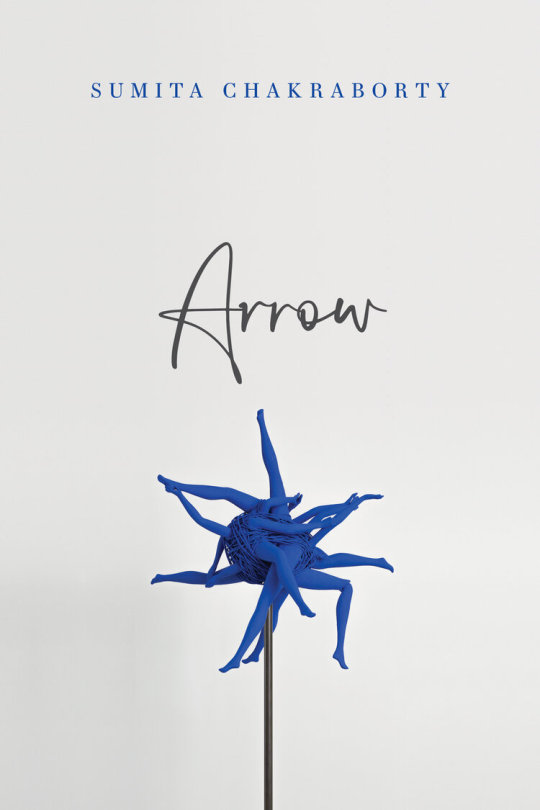
EB: Thank you so much for being part of the Wellesley Writes It series, Sumita! I’m excited to get to talk to you about writing in general, but especially your debut collection Arrow. Can you start off speaking a bit about how this book came about?
SC: Thank YOU so much! This is such a joy.
The book that’s now Arrow went through about seven prior full versions.
EB: Oh my gosh! Wow.
SC: While there’s a lot going on in there, the most fundamental story I wanted to tell was that of the experience of living in the aftermath of severe domestic violence, other entangled forms of assault, and grief (in my case, particularly for my sister, who died in 2014 at the age of 24). The word “aftermath” is a tricky one, because there is no neat and tidy “after” violence or grief, particularly when one considers the varying scales on which various devastations and mournings take place. One of the main narrative arcs of the collection, though, is that of becoming someone who can embrace love and joy and care and kinship even when those concepts have been weaponized or altogether foreclosed for all of one’s childhood and adolescence. And that’s a narrative that requires a sense of an “after” that I am deeply fortunate to have personally experienced. That’s the main tightrope the collection is invested in walking, which forms the through-line around which and with which its other preoccupations and obsessions orbit and collide.
EB: Wow, thank you so much for sharing all that, Sumita. I especially like what you said about the lack of a “neat and tidy” ending -- isn’t that always the case when it comes to writing about things from our own lives? We want real-life closure but sometimes have to settle for just narrative closure instead.
I meant to say also congratulations on the publication of your collection not only in the US but in the UK as well! What was it like to put that version together? The same? Different?
SC: I was wildly lucky in this regard. Some years ago, I published the poem “Dear, beloved” in Poetry, before it was in Arrow—and in fact before this version of Arrow even existed. At that point, the editor of Carcanet reached out to me to say that the press would be interested in bringing out my collection in the UK. I kind of panicked!
EB: I totally would have, too!
SC: As I mentioned, there was no Arrow yet. I was on a much earlier version that was “complete,” but when I looked at it, I knew: This ain’t it. And querying US presses was therefore not something I was prepared to do at that time; UK publication was even less within the realm of my imagination. I essentially told them the manuscript was in progress and asked if I could reach back out when it was ready and if I had secured a US publisher. Some years later, the collection was picked up by Alice James in the States and I reached back out to Carcanet to see if they were still interested, and they were! Alice James and Carcanet worked together during the production process, so while there were certainly some differences in approaches across either side of the pond, much of it was really streamlined, and that is all thanks to the outstanding and immense labor of the extraordinary editors and staffs at both publishers.

EB: How did you begin writing poetry in the first place? What was your path to becoming a writer?
SC: I didn’t come into much of a sense that I was interested in poetry and in literature until college. When I got there, I didn’t have a sense of really any passions and skills that I had, and that’s not imposter syndrome speaking—it’s because I had a terrible record in high school and found nothing inspirational there, and I was also pretty busy attempting to survive the violence I was experiencing at home and working toward moving out, which I did before college. In my first year and my sophomore fall at Wellesley, I took a really broad smattering of courses, including (with wild, and probably inappropriate, disregard for prerequisites in both cases) Advanced Shakespeare with William Cain and Advanced Poetry Writing with Frank Bidart. I was very much not good enough for both of those courses! But even as I was flailing around in them, something in my mind clicked: this was something I was willing to be terrible at until I started to understand it a bit better. These were puzzles that I liked, questions I liked, problems I cared about dwelling with. It was pretty much “love at first confusion.”
EB: I love that idea: “this was something I was willing to be terrible at.” That 100% nails how I feel about writing, too.
So, obviously, as you just said, Wellesley was very important in your trajectory as a poet -- the title of your book is a reference to a Frank Bidart poem! Which other faculty, staff, fellow students have influenced or inspired you? Are there any professors or classes you would tell young Wellesley writers that they 100% have to take?
SC: Following “love at first confusion,” I essentially made a second home of the first floor of Founders, so my answer to who at Wellesley influenced or inspired me could fill multiple pages!
EB: I love Founders. I miss Founders.
SC: I will invariably accidentally leave someone out and feel guilty, so I offer my mea culpas in advance. In addition to Bill Cain and Frank Bidart, I am beyond grateful to Dan Chiasson, with whom I worked on both my literary studies (including my thesis) and my poetry, and who graciously offered me more mentorship than I’d ever experienced in my life before that point; to Kate Brogan, from whom I got the bug for twentieth-century poetics, which remains the focus of my literary studies research; to Yoon Sun Lee, who taught the theory class when I took it, and planted a hugely important seed that I didn’t even know had been planted until much later simply by being a brilliant Asian American literary scholar (not a role I had ever before seen filled by someone of this subject position); to Larry Rosenwald, who was the first person I had ever met in a literary context who both knew that English was not my heritage language and, in his infinite and genuine passion for multilingualism, viewed that fact as a strength.
I wish I’d had more of a chance to get to know my peers while actually at Wellesley—my life circumstances while I was in college differed from the typical Wellesley experience in ways that made doing so challenging (for one, I worked multiple jobs the entire way through), but I’ve gotten to better know many people I knew at Wellesley more in the years since and that’s been a wonderful experience.
EB: I’ve also made a lot of Wellesley friends post-Wellesley. The Wellesley experience never ends, in that way.
SC: Since I’ve already spoken to the coursework that inspired me, I’m going to zig a bit where your last question zags: there isn’t a single course I would tell young Wellesley writers or literary enthusiasts that they 100% have to take. I don’t think one could go wrong with anyone I’ve named here (and I’ve been really excited to learn about the new additions to the English department: I would have loved to have learned from Cord Whitaker and Octavio González, and have heard wonderful things about both!). But I think that what made the Wellesley experience truly influential for me was that I had the opportunity, like Whitman’s “Noiseless Patient Spider” (though, um, not very noiselessly or patiently), to “launch’d forth filament, filament, filament,” and really listen to what spoke to me. I came in with no preconceptions, no expectations, no firm career plan (or even career plan). Knowing what undergraduates at environments like Wellesley frequently pressure themselves or feel pressured to do (or achieve or produce or attain), I don’t want to offer advice along the lines of a “must-do.” Rather, try things out and truly listen to yourself. What’s your “love at first confusion”?
EB: I know from personal experience that writing can be a really lonely practice. Who did you rely on for support during those really frustrating writing moments? Other writers? Your spouse? Friends? Fellow Wellesley grads? What does your writing/artistic community look like?
SC: All of the above! The thing is, for me, I don’t think writing is a lonely practice. When I feel most energized about writing, it is because I feel like I am in a conversation—or, to put a finer point on it, when I’m in a conversation that is nestled within hundreds of thousands of other conversations that have happened for millennia, are currently happening all around me, and will continue to happen after I’m a hunk of dirt. Tapping into that is often what brings me to the page in the first place.
EB: That’s such a good point.
SC: So when students, for example, feel really isolated or alone in their writing life, my first recommendation is to remind themselves of their beloveds. These may be actual living ride-or-die humans in their lives; these may be ghosts of writers and artists past that are important to them; they might be their most frequently bustling group text or their favorite TV show. Honestly, if one’s thinking of this question as broadly as I recommend, those beloveds probably belong to all of the above categories, to some degree. When you write, even if none of these beloveds are your subject or your audience or anything quite that easily analogous to the process, they are with you, and they have formed who you are before you’ve even picked up a pen or turned your computer on, so they are with you when you are writing, too.
EB: What is it like to now be teaching poetry to undergrads? Are you channeling your inner Dan Chiasson?
SC: Ha! Thank you for that—I just got a visual of myself trying to go as Dan for Halloween and I cracked myself up. (Dan, if you’re reading this: sorry!) I teach undergraduates and graduate students at Michigan, both in literary studies and in creative writing, and I love it very, very much. My students of all levels are brilliant, thoughtful, curious, and wildly imaginative people who often help bolster my faith in the ongoing importance of literary work. Honestly, particularly during this year, I have frequently been in awe of my students and have felt overwhelmingly lucky to be able to work with them.
EB: I know that you are also currently working on your first scholarly book, Grave Dangers: Death, Ethics, and Poetics in the Anthropocene. How do you approach writing poetry vs. writing an academic work? How is your creative process similar or different?
SC: For me the two have been inseparable since Wellesley. I essentially ask similar questions and have similar preoccupations no matter what genre I write; in terms of deciding which thought belongs to which genre, or which project a particular moment is better suited to, that’s often a matter of thinking carefully of what shapes that I want the questions to take, and what kinds of “answers”—in quotation marks because I don’t strive at certainty or mastery in either genre, or in anything for that matter—for which I imagine reaching or searching. For me, the processes for writing both are very, very similar: I draft wildly and edit painstakingly. It’s more a matter of closely listening to my patterns of thinking on any given subject or day in order to find out if the rhetorical patterns of academic prose would better suit them or if the rhetorical patterns of poetry would better suit them.
EB: What are you currently reading, and/or what have you read recently that you’ve really enjoyed? What would you recommend to read while we (are continuing to) lay low during this pandemic?
SC: 2020 was such an incredible year for books! Which feels somewhat perverse to say, considering everything else was dismal and it was hardly an easy year to put out a book, either. In terms of new poetry releases—and this is not a comprehensive list, so my mea culpas here too to the many that I have loved and will end up accidentally leaving off—I have this year read and loved: Taylor Johnson’s Inheritance, francine j. harris’s Here is the Sweet Hand, Craig Santos Perez’s Habitat Threshold, Jihyun Yun’s Some Are Always Hungry, Eduardo Corral’s Guillotine, Rick Barot’s The Galleons, Jericho Brown’s The Tradition, Shane McCrae’s Sometimes I Never Suffered, Victoria Chang’s Obit, Danez Smith’s Homie, Aricka Foreman’s Salt Body Shimmer, and Natalie Diaz’s Postcolonial Love Poem. Two prior-to-2020 poetry collections that I reread every year are Brigit Pegeen Kelly’s Song and Lucille Clifton’s The Book of Light. I’m currently reading Claudia Rankine’s Just Us and Alice Oswald’s Nobody.
EB: Also what about Lucie Brock-Broido? I know she was a teacher of yours at one time, and she was a professor in my MFA program. I had the pleasure of once sitting in on her lecture, and it was life-changing. Are there any particular poems of hers you would suggest?
SC: I joined Lucie’s summer workshop held at her home in Cambridge, MA the summer after my sophomore year at Wellesley, and I stayed in it until I moved to Atlanta for graduate school in 2012. “Life-changing” is right—in fact, it feels a little too modest. She was transformative. A cosmos-realigner. A hilarious, brilliant, extraordinarily kind meteor. A fox with wings. A unicorn. I could go on, and on. For a reader new to her work, I’d recommend starting with her posthumously published “Giraffe” in The New Yorker. I think “A Girl Ago” and “You Have Harnessed Yourself Ridiculously to This World” from Stay, Illusion (2015) are also remarkable entry points. After that, I would probably recommend reading her collections in this order: first Stay, Illusion; then A Hunger (1988); then The Master Letters (1997); and finally Trouble in Mind (2005). The sequencing here isn’t intended as a ranking in the least—my own personal favorites toggle back and forth depending on where my own “trouble in mind” lives, and each collection is dazzlingly strong and has its own raison d’être—but rather because I think the story those collections tell in that order would let a new reader have a full sense of Lucie’s poetics outside of the story that mere chronology can tell. ��
EB: Any advice for aspiring young poets?
SC: Filament, filament, filament. Let your writing life be as huge and wild and disparate as the whole person you are—don’t feel like there’s only a part of you that’s “worthy of poetry,” and don’t let anyone else tell you what kind of writer you should or shouldn’t be.
EB: Thank you, Sumita! That was wonderful.
#wellesley writes it#wellesleywritesit#wellesley#wellesley underground#wellesleyunderground#sumita chakraborty#eb bartels#e.b. bartels#class of 2008#class of 2010#poet#poetry#writer#writers
4 notes
·
View notes
Photo
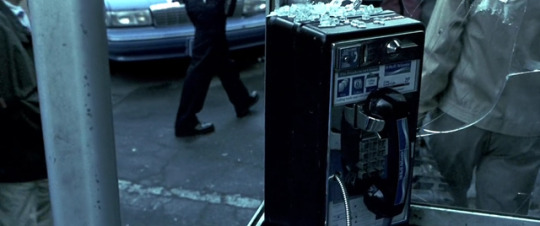
Bir Film Bir Kare #158 – Phone Booth (2002)
#birfilmbirkare#phone booth#telefon kulübesi#colin farrell#joel schumacher#larry cohen#kiefer sutherland#forest whitaker#radha mitchell#katie holmes#gizem#gerilim#film#movie#crime#mystery#thriller
2 notes
·
View notes